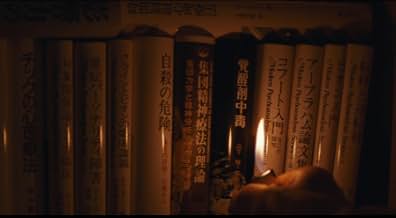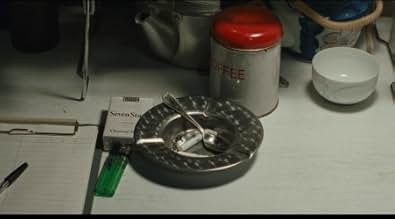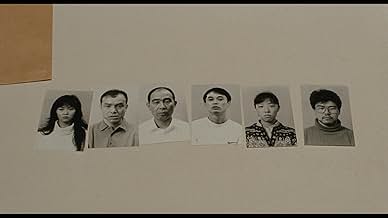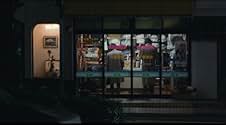Ein frustrierter Detektiv befasst sich mit dem Fall mehrerer grausamer Morde, die von Menschen begangen wurden, die sich nicht an ihre Taten erinnern können.Ein frustrierter Detektiv befasst sich mit dem Fall mehrerer grausamer Morde, die von Menschen begangen wurden, die sich nicht an ihre Taten erinnern können.Ein frustrierter Detektiv befasst sich mit dem Fall mehrerer grausamer Morde, die von Menschen begangen wurden, die sich nicht an ihre Taten erinnern können.
- Regie
- Drehbuch
- Hauptbesetzung
- Auszeichnungen
- 9 Gewinne & 2 Nominierungen insgesamt
Empfohlene Bewertungen
This movie has a simple premise and a simple story that is nevertheless explored in an incredibly delicate and talented way. Kiyoshi Kurosawa is an extremely talented individual and perhaps the only writer/director who is able to simultaneously scare and mentally challenge me at the same time (note that very few are capable of doing one or the other). Although the writing is very good (story and dialogue), Kurosawa's real strength is his ability to represent visually the progressive denouement of his story. He rather subtly show you and let your imagination and intellect figure it out for you than to spell out bluntly what the straightforward storyline should be. It does not, however, get to the point of chaotic untidiness or pointlessness, for he is able to guide you slowly along the way (I would then say that he is slightly easier to follow than David Lynch is, but then again who is not). He uses here a strikingly effective technique where he shows you a room from one angle and later lets you discover that room more and more as the movie advances. His camera shots are always well planned and he is thus able to draw you in the movie bit by bit-quite an eerie sensation.
The acting is generally good and believable. The camera-work is a stand out.
There are many scenes where you will be able to appreciate this superior artistic and technical quality. The music is good and tenseful, but it is sparse and what is used instead is a contrast of minimalist and grossly amplified everyday sounds that vibrate through the movie. When there is no sound, you often find yourself holding your breath. This is not used strictly as a ploy, but rather creates a mood and further pulls you in the general atmosphere of the movie. Most of all, again, the directing is top notch. The pace which is slow enough for you to have the time to both think and be afraid is not slow enough that it gets boring, although you should not expect a North American expeditious run through the film. Everything is there, but it comes to you in slow, meticulously chosen dosage. Only, at the end can you truly see the masterpiece that has been drawn stroke by stroke in front of you.
One of the reason this movie actually works is that it is designed to play with your mind and trigger fear and reaction based not only on emotion, but on reason. People are dying, but everything is calm, rational. The tone and story are pretty much realistic and, at the end of the experience, you may feel beyond your volitional control that you are actually convinced of the "strange" things in the movie. Hopefully this feeling will subside...
The acting is generally good and believable. The camera-work is a stand out.
There are many scenes where you will be able to appreciate this superior artistic and technical quality. The music is good and tenseful, but it is sparse and what is used instead is a contrast of minimalist and grossly amplified everyday sounds that vibrate through the movie. When there is no sound, you often find yourself holding your breath. This is not used strictly as a ploy, but rather creates a mood and further pulls you in the general atmosphere of the movie. Most of all, again, the directing is top notch. The pace which is slow enough for you to have the time to both think and be afraid is not slow enough that it gets boring, although you should not expect a North American expeditious run through the film. Everything is there, but it comes to you in slow, meticulously chosen dosage. Only, at the end can you truly see the masterpiece that has been drawn stroke by stroke in front of you.
One of the reason this movie actually works is that it is designed to play with your mind and trigger fear and reaction based not only on emotion, but on reason. People are dying, but everything is calm, rational. The tone and story are pretty much realistic and, at the end of the experience, you may feel beyond your volitional control that you are actually convinced of the "strange" things in the movie. Hopefully this feeling will subside...
It's not easy to give yourself over to this film, for like the unwilling victims' it portrays, it rather slowly and methodically casts its spell, whisking you farther and farther away from the comfortable rhythm and conventions of the crime thriller it appears to be on the surface.
Kyua's austere landscapes are in fitful turns picture postcard beautiful, mundane and mysterious. Much of the story unfolds in master shots, keeping you at a distance from the characters and affording the illusion of a comfortable intellectual detachment which it meticulously strips away scene by scene.
The plot is deceptively simple; a weary Japanese Homicide detective is investigating a series of grotesque murders. Each murder seems to have the same ritualistic pattern, yet in each case the culprit turns out to be an ordinary individual, dazed and unable to offer any motive for their horrific crime. Nothing seems to connect the murderers to each other, until the Detective picks up the trail of an amnesia afflicted drifter who seems unable to answer even the simplest questions about himself, yet displays a disconcerting ability to reflect any line of questioning about his own identity back upon the questioner. Time and again he returns to a question at the core of the mystery:
"Who are you?"
It seems more and more, as the drifter is passed from detective, to guard, to clinician to pyschiatrist, that this question is far more dangerous than anyone might have guessed.
Kyua is a model of subtlety and restraint. Although there's a significant amount of implied violence and several shocking scenes of murder, these aren't gratuitous. Kyua's particular genius is it's ability to transform it's urban Japanese landscapes and even the most common objects from familiar to suspect and eventually sinister: a length of piping, a flashing traffic sign, a blast furnace, the sound of ocean surf at night, a flickering lighter, a dark apartment lined with academic tomes, a puddle of spilled water, the letter X smeared on a wall, a deserted rundown building.
There are few filmmakers with the audacity and imagination to venture into the places Kyua wants to take you. Fincher, Lynch and Cronenberg come to mind as those who time and time again have shown their willingness, and perhaps compulsion to return to the unsettling territory of perception, identity, and the boundary between normalcy and psychosis. If the director's first name were only David (it's not, his name is Kiyoshi Kurosawa) we'd have the makings of a good conspiracy theory here.
The film was released in 1997 but only recently has made it's way to western shores, and US distribution by Cowboy Pictures, and has wound its way inevitably to cable networks like Sundance. It's cast includes Koji Yakusho as the detective Takabe. Fans of Japanese cinema will recognize this fine actor from his award winning roles in "Shall we Dance" and "The eel".
Kyua isn't the type of visceral immediate drama that the average suspense film provides. If you can put aside your preconceived notions and allow it to unfold in it's own time, I suspect you will find the questions it asks and secrets it reveals to be all the more disquieting, problematic and in the end profound. Many critics have lined up to call this film a masterpiece, and pegged Kurosawa as one of a number of japanese directors worth watching.
Kyua's austere landscapes are in fitful turns picture postcard beautiful, mundane and mysterious. Much of the story unfolds in master shots, keeping you at a distance from the characters and affording the illusion of a comfortable intellectual detachment which it meticulously strips away scene by scene.
The plot is deceptively simple; a weary Japanese Homicide detective is investigating a series of grotesque murders. Each murder seems to have the same ritualistic pattern, yet in each case the culprit turns out to be an ordinary individual, dazed and unable to offer any motive for their horrific crime. Nothing seems to connect the murderers to each other, until the Detective picks up the trail of an amnesia afflicted drifter who seems unable to answer even the simplest questions about himself, yet displays a disconcerting ability to reflect any line of questioning about his own identity back upon the questioner. Time and again he returns to a question at the core of the mystery:
"Who are you?"
It seems more and more, as the drifter is passed from detective, to guard, to clinician to pyschiatrist, that this question is far more dangerous than anyone might have guessed.
Kyua is a model of subtlety and restraint. Although there's a significant amount of implied violence and several shocking scenes of murder, these aren't gratuitous. Kyua's particular genius is it's ability to transform it's urban Japanese landscapes and even the most common objects from familiar to suspect and eventually sinister: a length of piping, a flashing traffic sign, a blast furnace, the sound of ocean surf at night, a flickering lighter, a dark apartment lined with academic tomes, a puddle of spilled water, the letter X smeared on a wall, a deserted rundown building.
There are few filmmakers with the audacity and imagination to venture into the places Kyua wants to take you. Fincher, Lynch and Cronenberg come to mind as those who time and time again have shown their willingness, and perhaps compulsion to return to the unsettling territory of perception, identity, and the boundary between normalcy and psychosis. If the director's first name were only David (it's not, his name is Kiyoshi Kurosawa) we'd have the makings of a good conspiracy theory here.
The film was released in 1997 but only recently has made it's way to western shores, and US distribution by Cowboy Pictures, and has wound its way inevitably to cable networks like Sundance. It's cast includes Koji Yakusho as the detective Takabe. Fans of Japanese cinema will recognize this fine actor from his award winning roles in "Shall we Dance" and "The eel".
Kyua isn't the type of visceral immediate drama that the average suspense film provides. If you can put aside your preconceived notions and allow it to unfold in it's own time, I suspect you will find the questions it asks and secrets it reveals to be all the more disquieting, problematic and in the end profound. Many critics have lined up to call this film a masterpiece, and pegged Kurosawa as one of a number of japanese directors worth watching.
WOW!!!! Now THAT was an EXCELLENT ending to a GREAT movie. It stuck with me for several hours after first watching it and the second time was no different. It had slow methodical pacing, but it was never boring. I, for one, appreciated the elliptical editing as it's just a filmmaker doing something different and being creative. Actually, it added to the hypnotic arc of the story. It didn't bother me whatsoever, although it wasn't nearly as effective in Kiyoshi's other great movie, "Kairo." Koji Yakusho was brilliant as troubled Detective Takabe and the mysterious drifter with hypnotic powers was very convincing as well. The use of hypnotism to get others to kill and rendering themselves soulless, was a refreshing take on the serial-killer subgenre, of which I love. Someone commented here that only people who "buy the mumbo jumbo" hypnotism storyline would like this film, and comments like those always bother me. Narrative films are not REAL LIFE, even the ones based on true stories. They are works of art, and try to tell us entertaining, comedic, frightning, and dramatic stories to keep the audience interested. I don't have to believe in the subjects their stories are telling me, nor do I believe they need to solve the world's problems. All I care is that they give me an interesting idea, an interesting story, with well-written dialogue, and if it ends with a bang. These, blended with great acting (now that's an area that needs convincing in film), great camera work, and an engaging score. Those are what make films interesting and "Kyua" aka "Cure" has all those qualities. Highly recommended.
I think it is important to distinguish Cure from the avalanche of white-face-ghost-girl Japanese horror flicks that followed in Ringu's wake. Purely because it's a different beast and lumping it in a convenient J-horror niche is doing it a disservice. I won't go into plot specifics because it's only a skeleton for Kurosawa to hang his atmospherics. That said, I can understand the complaint many viewers seem to share ("man, it doesn't make sense") but without having any claims on solving Cure's riddle, I'm satisfied with letting wash over me, one watch at a time.
Kurosawa wisely doesn't attempt to explain his plot. He's content to lift the veil just enough for us to sneak a glimpse in before he disorients again. The plot slowly builds through little tokens that are never followed by an orchestral crescento to signal their arrival. They just happen. A small photo in a book, muffled words on a phonogram, an old video, the ramblings of an amnesiac, theories on 18th century Austrian doctors. In the course of the film, everything seems to be coming together only to remain elusive in the end. In that aspect I find Cure to be closer to Last Year at Marienbad than your average Ringu clone. It's not about making sense, it's about pushing limits within which you can. It's about soaking in the impression it makes. When muffled words come through a phonogram, they're more incoherent ramblings than a telegraphed plot solution; but they contribute just as well to the overarching feel. This elliptic mentality is abetted by Kurosawa's choice of a slow, deliberate pace and many long shots, entire scenes covered without any cuts. The gritty and rundown aspect of Tokyo is photographed like a more naturalistic version of David Fincher's work and does the job well.
It's my impression that a surrealist air hovers above and at the heart of Cure, at times reminiscent of a more languid version of Lynch. It is undoubtedly a horror movie so don't be put off by my Resnais comparison, but it's as much bleak as it is subtle and leaves enough to the mind's eye to make you carry it out with you.
Kurosawa wisely doesn't attempt to explain his plot. He's content to lift the veil just enough for us to sneak a glimpse in before he disorients again. The plot slowly builds through little tokens that are never followed by an orchestral crescento to signal their arrival. They just happen. A small photo in a book, muffled words on a phonogram, an old video, the ramblings of an amnesiac, theories on 18th century Austrian doctors. In the course of the film, everything seems to be coming together only to remain elusive in the end. In that aspect I find Cure to be closer to Last Year at Marienbad than your average Ringu clone. It's not about making sense, it's about pushing limits within which you can. It's about soaking in the impression it makes. When muffled words come through a phonogram, they're more incoherent ramblings than a telegraphed plot solution; but they contribute just as well to the overarching feel. This elliptic mentality is abetted by Kurosawa's choice of a slow, deliberate pace and many long shots, entire scenes covered without any cuts. The gritty and rundown aspect of Tokyo is photographed like a more naturalistic version of David Fincher's work and does the job well.
It's my impression that a surrealist air hovers above and at the heart of Cure, at times reminiscent of a more languid version of Lynch. It is undoubtedly a horror movie so don't be put off by my Resnais comparison, but it's as much bleak as it is subtle and leaves enough to the mind's eye to make you carry it out with you.
This enigmatic, slow-burning horror focuses on a series of grisly, almost identical murders committed by people who can't remember why or how they did them. The mystery of 'Cure (1997)' shifts from uncovering the link between the killings to deciphering the true nature of a strange amnesiac who pops up near each crime scene. The movie never gives you an overt answer, remaining decidedly ambiguous even as it enters its final moments, but it's consistently compelling nevertheless. It pulls you into its beguiling world and doesn't let you go. It isn't overtly scary; its horrors creep up on you, sending shivers down your spine before you even know they're there. Its themes are fairly frightening and its cold, somewhat uncaring atmosphere doesn't afford much in the way of comfort. There are some sequences that are almost hypnotic, too. Though almost every aspect of the piece is relatively subdued, it has a rather strong overall effect. It's the sort of thing that has the potential to keep you up at night. 7/10
Wusstest du schon
- Patzer(at around 51 mins) In Japan, they drive on the left side of the road and the steering wheel is on the right side of the car. In every scene in this picture that's the case - except one. When the detective leaves in his car to go to the hospital because Mamiya has turned up there, the steering wheel is on the left and he drives on the right side of the road.
- Zitate
Kunio Mamiya: All the things that used to be inside of me... now they are all outside.
- Crazy CreditsThere are no opening credits, with the exception of the movie's title.
- VerbindungenEdited into Cure: or How to Be Happy While Saving the Species (2017)
Top-Auswahl
Melde dich zum Bewerten an und greife auf die Watchlist für personalisierte Empfehlungen zu.
- How long is Cure?Powered by Alexa
Details
Box Office
- Budget
- 1.000.000 ¥ (geschätzt)
- Weltweiter Bruttoertrag
- 232.829 $
- Laufzeit1 Stunde 51 Minuten
- Farbe
- Sound-Mix
- Seitenverhältnis
- 1.85 : 1
Zu dieser Seite beitragen
Bearbeitung vorschlagen oder fehlenden Inhalt hinzufügen

![A mesmerising and hypnotic psychological thriller from Kiyoshi Kurosawa...
Released to critical acclaim in both the East and the West, CURE was a breakthrough film for director Kiyoshi Kurosawa, a nerve shredding thriller about the hunt for a serial killer in a bleak and decaying Tokyo.
A series of murders have been committed by ordinary people who claim to have had no control over their horrifying actions. Following the only link - a mysterious stranger who had brief contact with each perpetrator and their victim - detective Kenichi Takabe (Kôji Yakusho, 13 ASSASSINS, TOKYO SONATA) places his own sanity on the line as he tries to end the wave of inexplicable terror.
Described as one of the greatest films of all time by Bong Joon-ho (THE HOST, SNOWPIERCER), CURE is a deeply unsettling masterpiece of its genre, and has shockingly been unavailable on home video in the UK until now. The Masters of Cinema Series is proud to present Cure in a special Dual Format edition.
CURE [Kyua], Kiyoshi Kurosawa's mesmerising and hypnotic psychological thriller, is released on home video for the first time in the UK as part of The Masters of Cinemas Series in a Dual Format edition on 23 April 2018.](https://m.media-amazon.com/images/M/MV5BZjdlYmU3YTktZTQzNi00YWE5LTgzZjQtYmI3OTRkNTQyYTkxXkEyXkFqcGdeQXVyMTg2NTc4MzA@._V1_QL75_UX500_CR0)






















